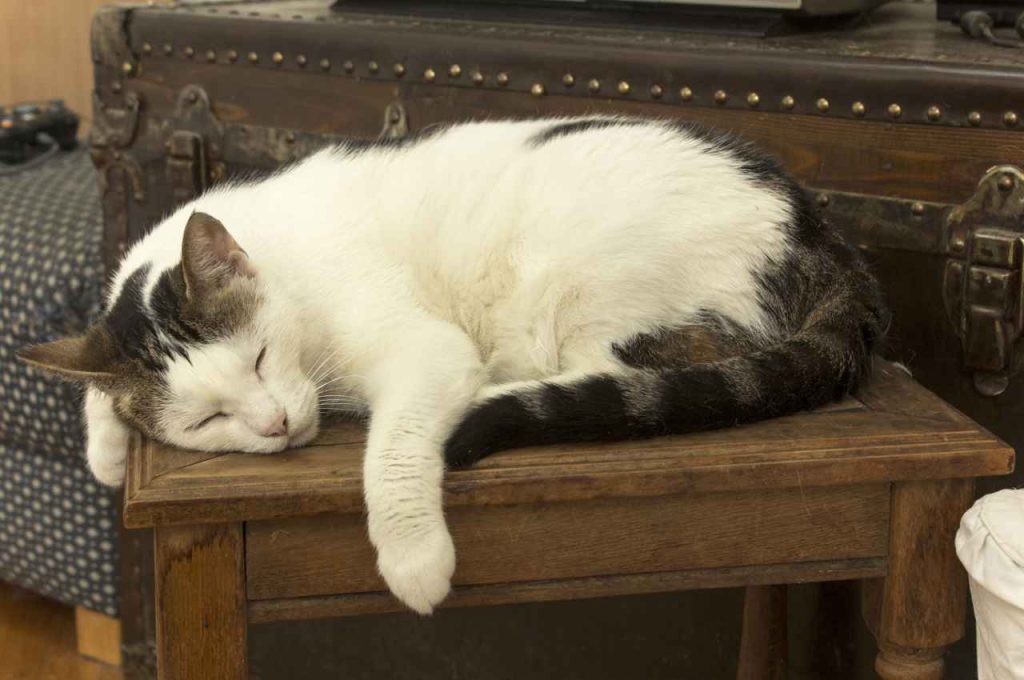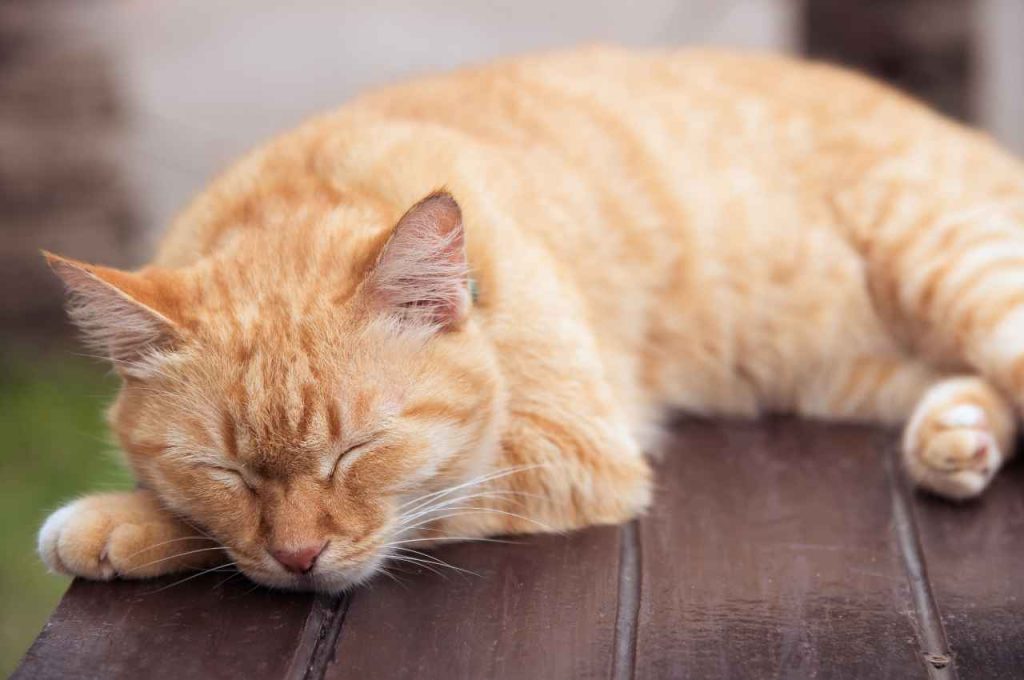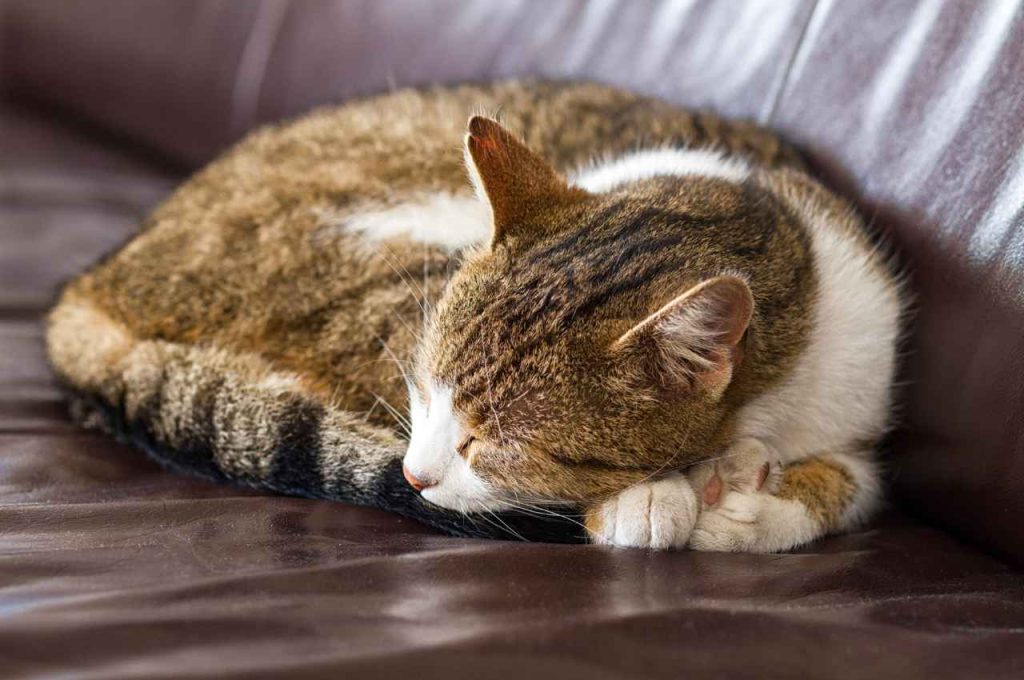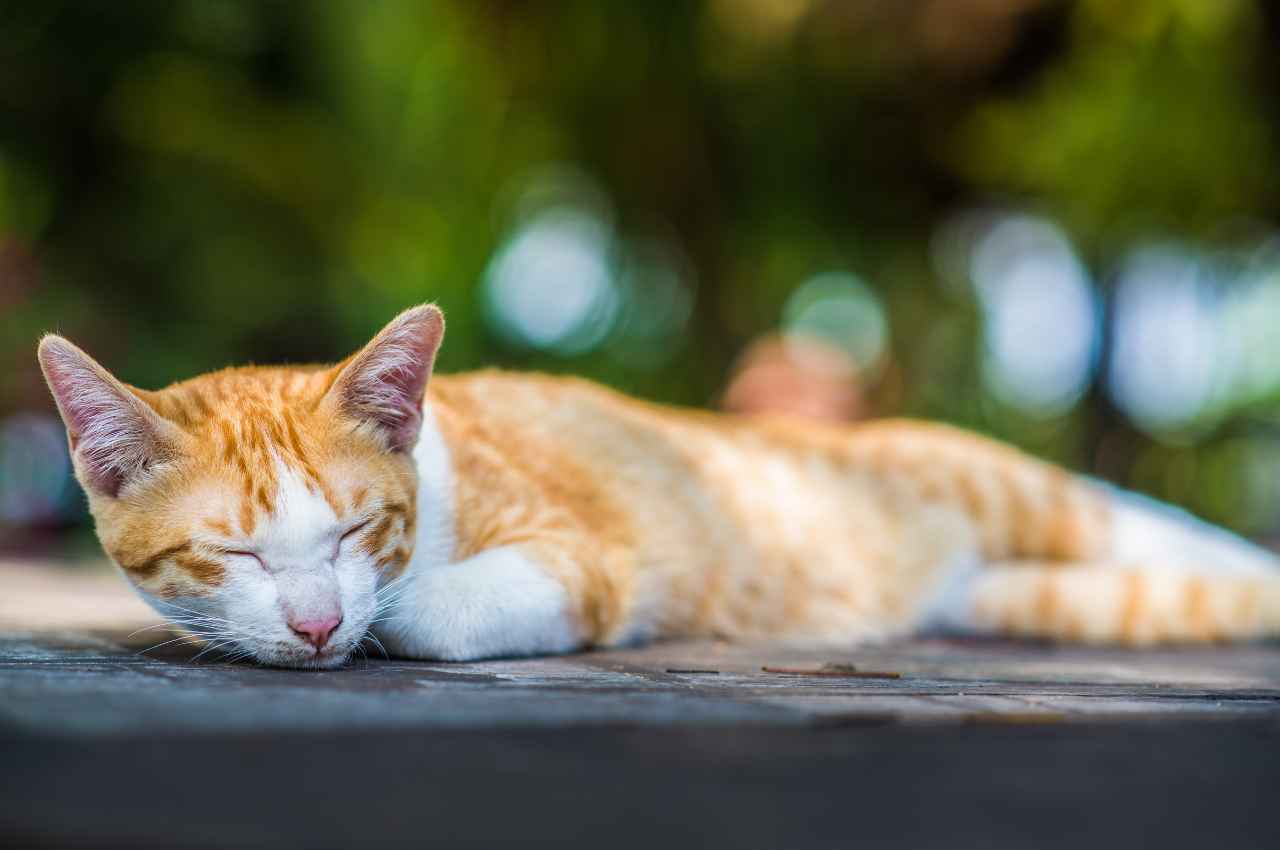To change your cat’s sleeping habits, establish a consistent routine and provide a comfortable sleeping environment. Additionally, play with your cat during the day to encourage activity and tire them out for a better night’s sleep.
As a cat owner, you may have noticed that cats sleep a lot. In fact, cats can sleep up to 16 hours a day! However, if your cat’s sleeping habits are disrupting your own sleep or if you want to encourage more activity during the day, you may want to change their sleeping habits. Changing your cat’s sleeping habits can be a gradual process, and it’s important to establish a consistent routine and provide a comfortable sleeping environment.
We will discuss some tips on how to change your cat’s sleeping habits and ensure that they are getting enough rest while also being active during the day.
Introduction to Feline Sleep Patterns
Understanding feline sleep patterns is key to ensuring your cat’s well-being. Cats are crepuscular, meaning they are most active during dawn and dusk. They typically sleep 12-16 hours a day, with kittens and older cats sleeping even more.

Their sleep includes both light dozing and deep REM sleep. Recognizing these patterns helps in creating a comfortable environment, ensuring they get the rest they need for optimal health and happiness.
Cats’ Natural Sleep Rhythms
Cats are crepuscular animals, meaning they are most active during dawn and dusk. They have short bursts of energy followed by long periods of rest throughout the day.
Impact of Domestication on Sleep
Domesticated cats may adjust their sleep patterns to align with their human companions. However, they still retain their natural instinct to sleep in short intervals.
Identifying Unhealthy Sleeping Habits
Identifying Unhealthy Sleeping Habits in your cat is essential for promoting their overall well-being. By recognizing signs of excessive sleep, disrupted sleep, and related health issues, you can take proactive steps to address and improve your cat’s sleeping habits.
Signs of Excessive Sleep
Cats are known for their love of napping, but excessive sleep can indicate potential health issues. Signs such as lethargy, lack of interest in play, and excessive daytime sleepiness could point to underlying problems.
Disrupted Sleep and Health Issues
Disrupted sleep patterns in cats may manifest as frequent waking during the night, restlessness, or excessive meowing. Such behaviors can lead to health issues like obesity, stress, and irritability, impacting your cat’s overall well-being.
The Role of Diet in Sleep
The role of diet in cat sleep is crucial. A balanced diet supports overall health, including sleep patterns. Cats should receive high-quality, protein-rich food appropriate for their age and health status. Avoiding overfeeding and providing meals at regular times can also promote better sleep. Adequate hydration is essential, as it affects overall well-being and may influence how restful their sleep is.
Nutritional Influences on Sleep
Certain nutrients can promote better sleep quality for your cat, such as:
- Tryptophan: Amino acid that aids in the production of serotonin, promoting relaxation.
- Magnesium: Helps in muscle relaxation and calming the nervous system.
Feeding Times and Sleep Quality
Consistent feeding times can help regulate your cat’s sleep-wake cycle, leading to:
- Improved digestion and reduced chances of nighttime waking.
- Balanced energy levels throughout the day for better sleep at night.
Creating a Conducive Sleep Environment
Changing your cat’s sleeping habits can be a challenging task, but by creating a conducive sleep environment, you can help encourage better sleep patterns for your furry friend. Here are a few key aspects to consider:
Comfortable Bedding Choices
Providing your cat with a comfortable bed is crucial for promoting good sleep. Choose a bed that is soft, supportive, and the right size for your cat. Cats often prefer beds with raised sides or enclosed spaces that provide a sense of security. Consider incorporating these options into your cat’s sleeping area to enhance their comfort.
Ideal Sleeping Locations
The location of your cat’s sleeping area can greatly impact their sleep habits. Cats tend to seek out quiet, peaceful spots where they feel safe and secure. Find a location in your home that is away from high-traffic areas and noise. Additionally, ensure that the temperature in the sleeping area is comfortable for your cat. Cats generally prefer slightly warmer temperatures, so providing a cozy environment can help them relax and sleep better.
Creating a conducive sleep environment for your cat involves selecting the right bedding and choosing an ideal sleeping location. By considering these factors and providing a comfortable and calming space, you can help improve your cat’s sleeping habits and ensure they get the rest they need.
Exercise as a Sleep Regulator
Exercise can play a crucial role in regulating a cat’s sleep habits. By engaging your cat in physical activities, you can help them expend energy and establish a healthier sleep routine.
It’s not uncommon to find your cat sleeping for hours on end during the day and then keeping you up all night with their playful antics. However, you can train your cat to sleep through the night by regulating their exercise routine.
Daytime Activity to Promote Nighttime Rest
Cats are naturally active creatures, and they need to expend their energy during the day to ensure they get a good night’s sleep. Encourage your cat to engage in moderate physical activity during the day. Provide them with toys that they can play with on their own, such as balls and stuffed mice.
Interactive Play Sessions
Interactive play sessions with your cat are an excellent way to help them expend their energy. You can use toys that mimic prey, such as feather wands, to encourage your cat to run and jump. These play sessions should take place several times throughout the day, but it’s essential to avoid playing too close to bedtime, as this can stimulate your cat and keep them awake.
To sum up, to change your cat’s sleeping habits, you need to regulate their exercise routine. Encourage them to engage in physical activity during the day and provide them with toys that they can play with on their own. Interactive play sessions with your cat are also essential to help them expend their energy. With a little patience and consistency, you can train your cat to sleep through the night.
Establishing a Routine
Establishing a routine is essential when it comes to changing your cat’s sleeping habits. Cats are creatures of habit, and by creating a consistent daily schedule and bedtime rituals, you can help regulate their sleep patterns. In this section, we will explore the importance of consistency in a daily schedule and the bedtime rituals that can promote better sleep for your feline friend.

Consistency in Daily Schedule
A consistent daily schedule can greatly influence your cat’s sleeping habits. Cats thrive on routine, and having a structured schedule can help them understand when it’s time to sleep and when it’s time to be active. Here are some tips to maintain consistency:
- Set regular feeding times: Cats are more likely to feel sleepy after a meal, so feeding them at the same time every day can help establish a sleep routine.
- Designate playtime: Engaging your cat in play sessions at specific times during the day can help expend their energy and promote restful sleep later on.
- Create a quiet environment: Make sure your cat has a calm and quiet space where they can retreat for uninterrupted sleep. Minimize loud noises and disturbances during their designated sleep hours.
Bedtime Rituals for Cats
Bedtime rituals can signal to your cat that it’s time to wind down and prepare for sleep. By incorporating these rituals into your cat’s routine, you can help them establish healthy sleep habits:
- Brushing or grooming: Spend a few minutes each night brushing your cat’s fur. This not only helps keep their coat healthy but also provides a relaxing bonding experience.
- Interactive playtime: Engage your cat in a short play session before bedtime. Use toys that encourage physical activity, such as laser pointers or feather wands, to help tire them out.
- Quiet time: Create a calm and soothing environment in the hour leading up to bedtime. Dim the lights, play soft music, and provide a comfortable sleeping area for your cat.
- Establish a bedtime routine: Develop a consistent sequence of activities that you perform each night before your cat goes to sleep. This could include providing fresh water, ensuring the litter box is clean, and offering a small bedtime snack.
By implementing these bedtime rituals and maintaining a consistent daily schedule, you can help your cat adjust their sleeping habits and promote better quality sleep. Remember, patience and consistency are key when it comes to changing your cat’s routine, so stick with it and observe how your feline companion adapts over time.
Stress Reduction and Sleep Improvement
Reducing stress is essential for improving cat sleep. Provide a calm environment with comfortable resting spots and familiar scents. Regular playtime and interactive toys can alleviate stress. Maintain a consistent daily routine to promote relaxation. Minimize loud noises and sudden changes to help your cat feel secure, facilitating better quality sleep.
Identifying Sources of Stress
Cats, like humans, can experience stress that disrupts their sleeping habits. Identifying the sources of stress is crucial in helping your feline friend achieve restful sleep. Common stressors for cats include changes in their environment, introduction of new pets, loud noises, and separation anxiety.
Calming Techniques
Implementing calming techniques can help reduce your cat’s stress levels and improve their sleep quality. Creating a peaceful environment through the use of soothing music, pheromone diffusers, and comfortable sleeping areas can work wonders. Regular play sessions, interactive toys, and providing hiding spots can also aid in reducing stress and promoting better sleep.
When to Consult a Veterinarian
To improve your cat’s sleeping habits, consider consulting a veterinarian for personalized advice and solutions. They can offer guidance tailored to your cat’s specific needs, ensuring a restful and healthy sleep routine.
If you’ve tried various strategies to change your cat’s sleeping habits without success, it may be time to consult a veterinarian. A veterinarian can help identify any underlying health issues or behavioral problems that may be affecting your cat’s sleep. Additionally, they can provide expert guidance on how to address these issues effectively.
Medical Reasons for Sleep Disturbances
Some medical conditions can cause sleep disturbances in cats, leading to changes in their sleeping habits. These conditions may include hyperthyroidism, arthritis, urinary tract infections, or gastrointestinal issues. If you notice significant changes in your cat’s sleep patterns, such as excessive sleep or insomnia, it’s crucial to seek veterinary attention to rule out any potential medical causes.
Professional Behavioral Interventions
When attempting to change your cat’s sleeping habits, professional behavioral interventions can be incredibly beneficial. Certified animal behaviorists or veterinarians specializing in behavior can provide expert guidance tailored to your cat’s specific needs. They can assess your cat’s environment, routines, and behaviors to develop a comprehensive plan to improve their sleep patterns.
Monitoring Progress and Adjustments
Monitoring your cat’s progress and making necessary adjustments is crucial when it comes to changing their sleeping habits. By closely tracking sleep changes and fine-tuning your approach, you can ensure that your feline friend is on the path to healthier and more balanced sleep patterns.
Tracking Sleep Changes
Tracking your cat’s sleep changes allows you to gather valuable data and insights into their sleeping habits. Here are a few ways you can effectively monitor their progress:
- Keep a Sleep Journal: Maintain a sleep journal to record your cat’s sleep patterns, including the duration and quality of their sleep. This will help you identify any recurring patterns or irregularities.
- Observe Behavior: Pay close attention to your cat’s behavior during the day. Note any signs of excessive sleepiness, restlessness, or frequent napping. These observations can provide valuable clues about their sleep habits.
- Use Technology: Consider using a pet activity tracker or a smart camera to monitor your cat’s sleep and activity levels. These devices can provide you with accurate data on their sleep duration and patterns.
Fine-tuning Your Approach
Once you have gathered enough information about your cat’s sleep habits, it’s time to make adjustments to improve their sleep quality and establish a healthier routine. Here are some strategies to fine-tune your approach:
- Create a Consistent Schedule: Establish a regular sleep schedule for your cat by setting specific times for feeding, playtime, and sleep. Consistency is key to helping them adjust to a new routine.
- Create a Comfortable Environment: Ensure that your cat’s sleeping area is quiet, cozy, and free from distractions. Provide them with a comfortable bed and consider using calming aids such as pheromone diffusers or soft background music.
- Encourage Physical Activity: Engage your cat in regular play sessions to help them burn off excess energy. Physical activity during the day can promote better sleep at night.
- Consider Dietary Changes: Consult with your veterinarian to determine if any dietary changes are necessary. Certain foods or supplements can help promote better sleep and overall well-being for your cat.
Remember, changing your cat’s sleeping habits requires patience and consistency. Monitor their progress, make adjustments as needed, and consult with a veterinarian if you have any concerns about their sleep patterns or overall health.
Harmonious Living With a Well-rested Cat
If you’re tired of being woken up in the middle of the night by your restless cat, or if you’re concerned about your cat’s health due to poor sleep habits, there are steps you can take to help your feline friend get the rest they need. By creating a calm and comfortable sleeping environment, establishing a consistent routine, and providing plenty of opportunities for exercise and play, you can help your cat achieve better sleep and improve their overall quality of life.
Benefits of Improved Sleep Habits
When your cat gets the rest they need, there are a number of benefits you may notice:
- Increased energy and playfulness during waking hours
- Improved mood and behavior
- Reduced risk of obesity, diabetes, and other health issues
- Less disruption to your own sleep schedule
Maintaining Long-term Sleep Health
Once you’ve established healthy sleep habits for your cat, it’s important to maintain them over the long term. Some tips to keep in mind include:

- Regular veterinary check-ups to monitor your cat’s overall health
- Adjusting your cat’s sleep environment as needed (e.g. adding more comfortable bedding or adjusting the temperature)
- Sticking to a consistent feeding and exercise schedule
- Keeping an eye out for any changes in your cat’s behavior or sleep habits that may require attention from a veterinarian
By prioritizing your cat’s sleep health, you can create a happier and more harmonious home for both you and your feline friend.
Conclusion
Ultimately, altering your cat’s sleep patterns requires patience and consistency. By implementing gradual changes and creating a comfortable sleeping environment, you can help your feline friend establish healthier habits. Remember, understanding your cat’s needs and behaviors is key to promoting better sleep quality for your beloved pet.
